Key takeaways:
- Setting clear rehearsal objectives enhances motivation, focus, and fosters teamwork among cast members.
- Maintaining a consistent yet flexible rehearsal schedule, alongside planned breaks, maximizes productivity and team spirit.
- Creating a distraction-free and well-arranged rehearsal space boosts creativity and performance quality.
- Incorporating feedback and reflection on rehearsal outcomes encourages personal growth and strengthens the collaborative bond within the team.
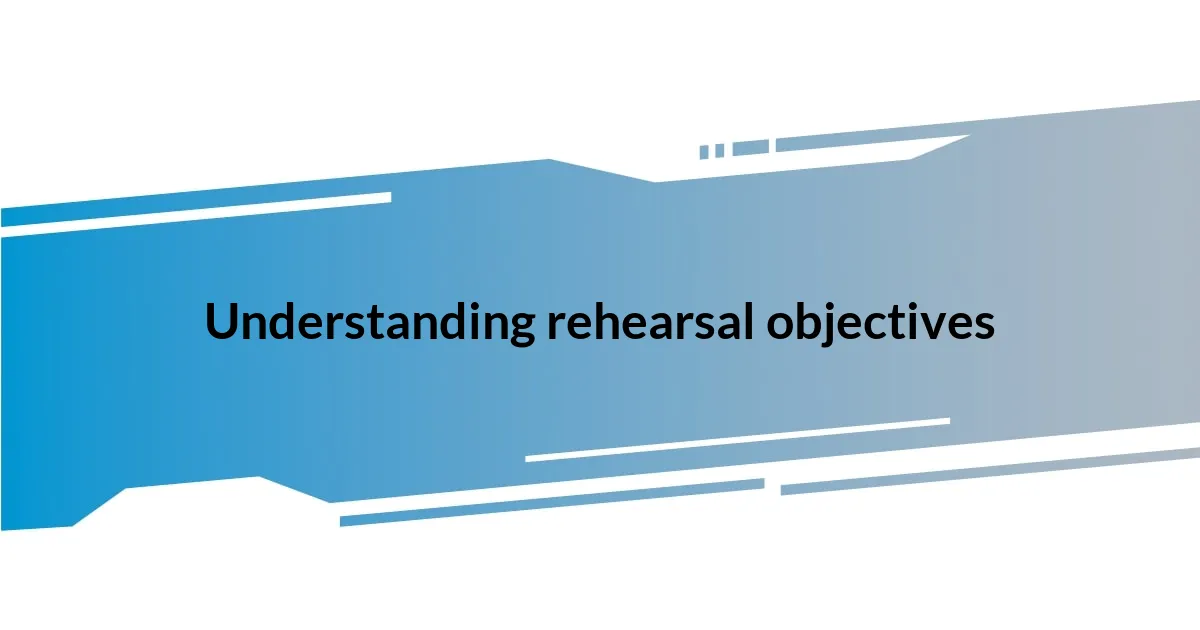
Understanding rehearsal objectives
When I think about rehearsal objectives, it’s all about clarity and focus. I remember a time when I walked into rehearsal, unsure of what I wanted to achieve. It wasn’t until I took a moment to define specific goals, like mastering my lines or improving my character’s emotional depth, that I felt a surge of motivation and purpose. Isn’t it incredible how knowing what you’re striving for can transform the entire experience?
Setting objectives not only keeps the rehearsal structured but also creates a space for growth. I often find that breaking down larger goals into smaller, measurable ones, like working on a particular scene or emotional transition, makes it less overwhelming. Have you ever tackled a challenging scene and felt a rush of satisfaction when you finally nailed it? That feeling comes from achieving the specific objectives you set for yourself.
Moreover, I’ve learned that understanding rehearsal objectives fosters teamwork. When everyone in the cast knows the focus of each session, it cultivates a supportive environment where collaboration thrives. I recall one rehearsal where we all discussed our personal goals. This exchange not only helped us connect on a deeper level but also made our performance stronger as we worked together to lift each other toward our collective objectives. Isn’t it fascinating how shared goals can enhance the creative process?
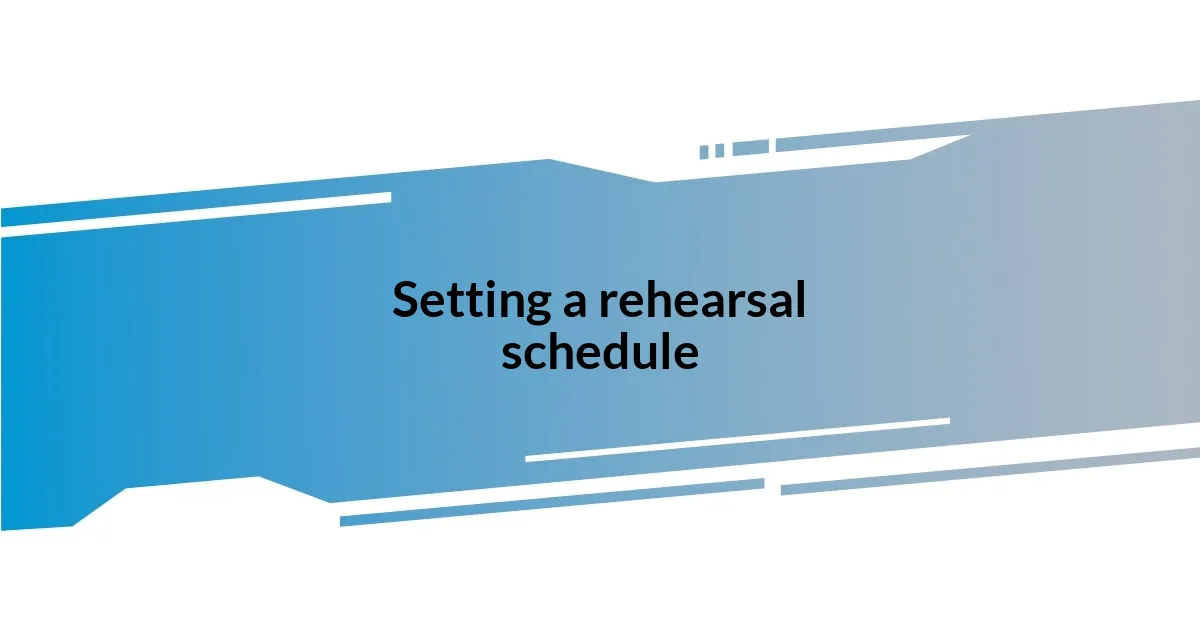
Setting a rehearsal schedule
Setting a rehearsal schedule is an essential step to ensure that everything runs smoothly. I learned early on that consistency is key. When I first started out, I struggled with overlapping commitments, which often left me frazzled. That’s when I decided to map out a weekly rehearsal calendar. By dedicating specific times for practice—such as Tuesday and Thursday evenings—I found I could commit fully without distractions, making each session far more productive.
I also discovered the importance of flexibility within that schedule. While I stick to my set days, life is unpredictable. Once, I had to shift a rehearsal for a special event that came up unexpectedly. I communicated with my cast members ahead of time, and we ended up having an energizing session on a different day. This adaptability not only kept us on track but also reinforced our team spirit, as everyone rallied to accommodate the change.
Lastly, I emphasize the need to balance intensive work with breaks. I’ve noticed that cramming too much into a rehearsal can lead to burnout. For instance, I always plan a 10-minute break for every hour of practice, allowing everyone to recharge. This small adjustment makes a noticeable difference—when we return to work, it’s like we have a fresh burst of energy.
| Aspect | Frequency |
|---|---|
| Structured Sessions | 2-3 times a week |
| Flexibility | As needed |
| Breaks | Every hour |
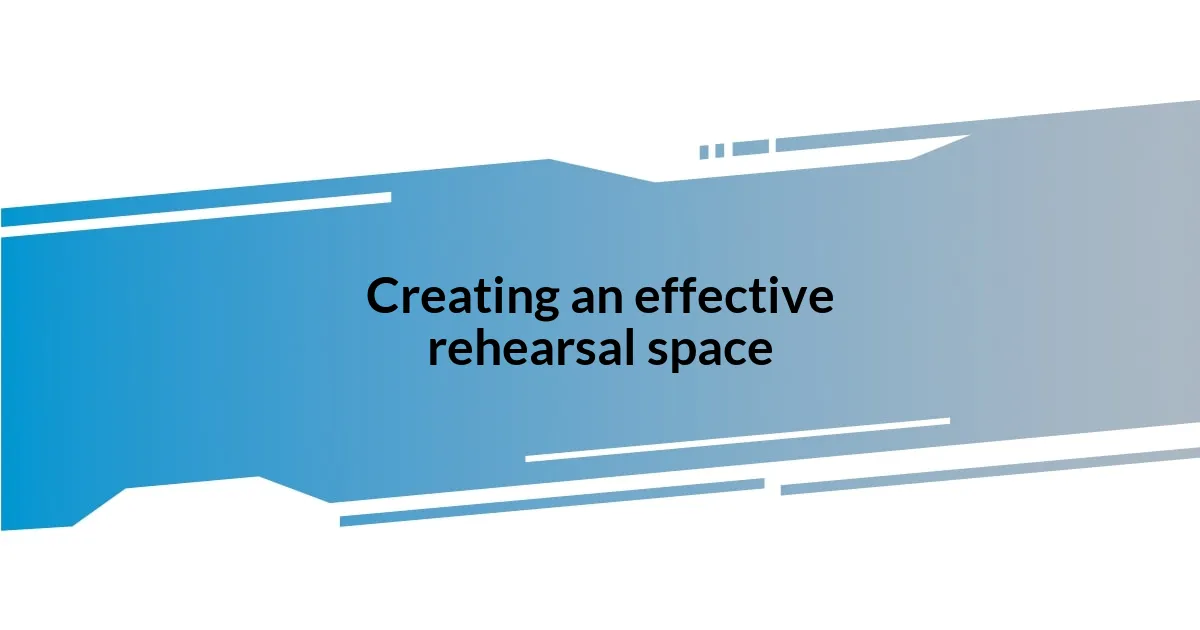
Creating an effective rehearsal space
Creating an effective rehearsal space is all about setting the right environment to foster creativity and productivity. I’ve found that the physical setup can significantly influence how I and my fellow performers feel during practice. I remember one rehearsal where we shifted from a cramped studio to a larger, airy space. The difference was palpable; not only did we breathe easier, but ideas flowed more freely, leading to spontaneous creativity. It’s amazing how a little room to move can inspire a whole new level of performance, don’t you think?
Equally important is minimizing distractions. I often ask everyone to silence their phones and refrain from chatting about unrelated topics during practice. Here are a few considerations that have worked wonders for me:
- Lighting: Ensure the space is well-lit, but not overly bright. A warm atmosphere can enhance creativity.
- Seating Arrangement: Arrange chairs in a circle or semi-circle to promote inclusivity and collaboration.
- Props and Materials: Keep necessary materials easily accessible, so interruptions are minimized.
- Sound Control: Use soundproofing or select a quiet time for rehearsals to avoid outside noise.
- Ventilation: A fresh and clean space makes a huge difference in keeping energy levels up.
I genuinely believe that when the rehearsal space is thoughtfully arranged and free from distractions, it helps everyone focus on what truly matters—the art we’re creating together.
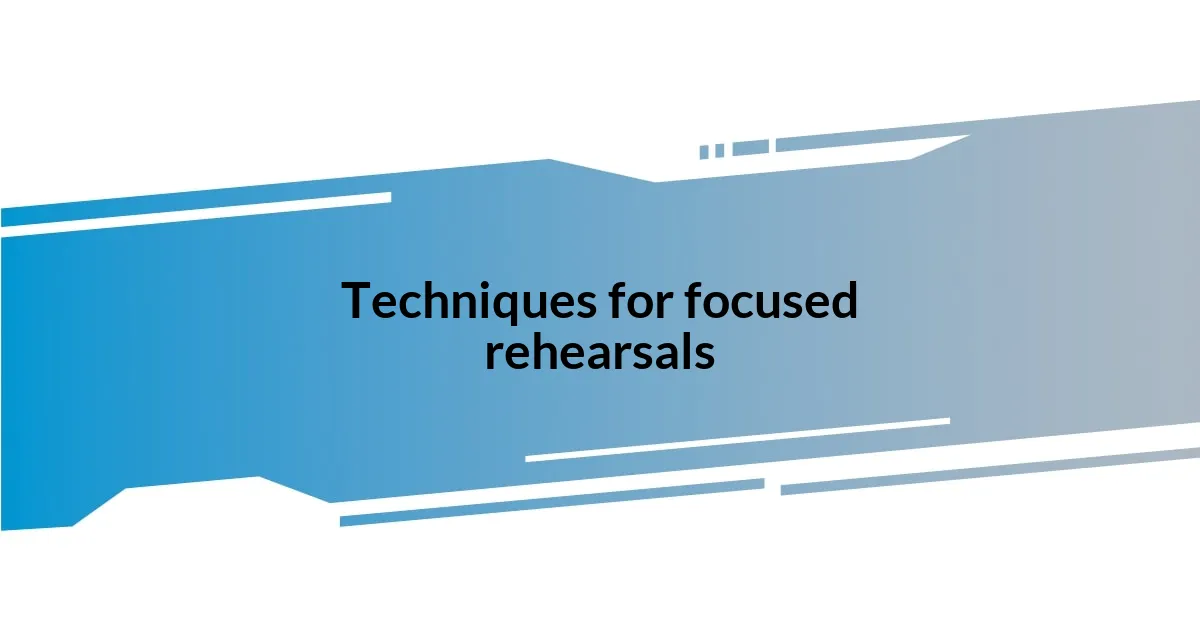
Techniques for focused rehearsals
One technique that has really transformed my rehearsals is setting specific objectives for each session. Before we even begin, I take a moment to outline what we hope to achieve, whether it’s polishing a particular scene or perfecting a song. This purposeful approach not only keeps us on track but also creates a sense of excitement—everyone walks in knowing exactly what we’re working toward. Have you ever found yourself in a rehearsal where you just weren’t sure what you were supposed to do? Setting these clear goals makes a world of difference.
Another method I employ is incorporating varied exercises that cater to different skills. For example, last week, we kicked things off with a quick improv game to get everyone loosened up before diving into more serious content. That shift in focus energizes the group, allowing for laughter and creativity before the hard work begins. It’s incredible how a little fun can break down barriers, making performers feel more comfortable expressing themselves. I like to think it’s like shaking up a bottle of soda—it creates fizz and excitement that enhances our collaborative spirit!
Lastly, I make it a point to maintain open communication throughout the rehearsal. I encourage feedback not just from the directors but from every cast member. During one session, a fellow actor suggested a slight tweak to my character’s delivery that completely changed the scene’s impact. It surprised me how a simple suggestion could elevate our performance. By inviting everyone to share their thoughts, we create a culture of trust and mutual respect. If everyone feels heard, doesn’t that lead to stronger performances?
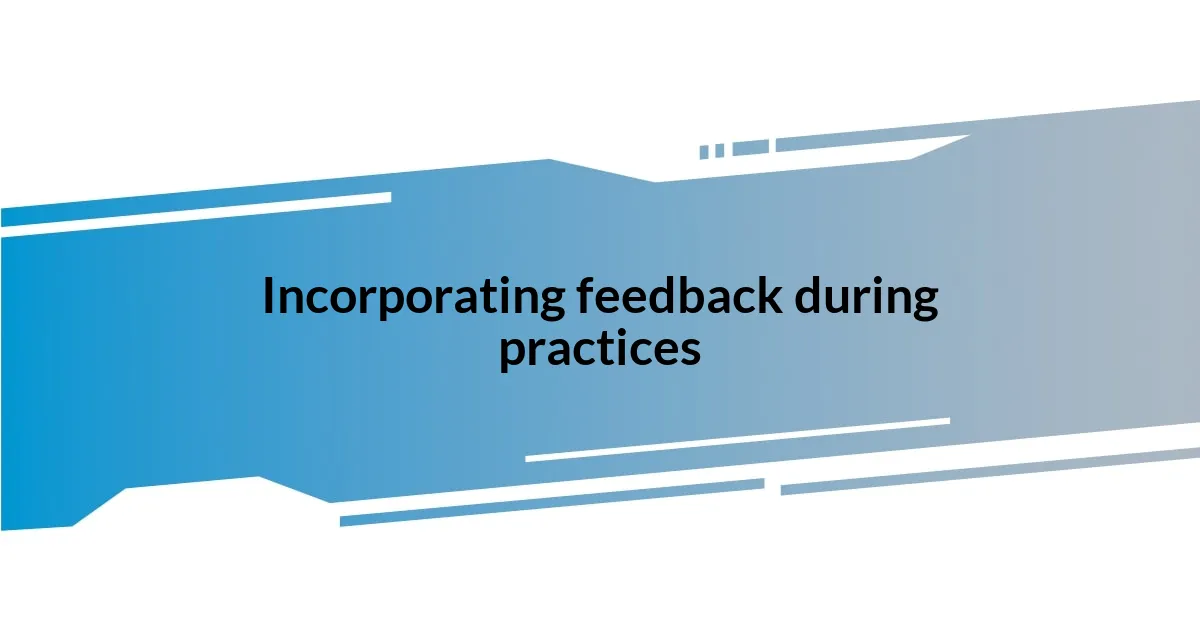
Incorporating feedback during practices
I always found that incorporating feedback during rehearsals is a critical component of improvement. For instance, after a tough session, I once asked my peers to share their thoughts on my performance. The candid responses I received, although initially daunting, opened my eyes to nuances I’d never considered. It was remarkable how adjusting my delivery based on their perspectives completely transformed the emotional depth of my character. That experience emphasized to me how vital it is to welcome and cherish constructive criticism.
Additionally, I have a habit of keeping a feedback notebook. At the end of each rehearsal, I jot down observations not only from others but from my self-reflections, too. There was a rehearsal last month where I noticed a recurring theme in the critiques about pacing. By reviewing my notes regularly, I pinpointed specific areas to focus on, which eventually led to a smoother, more dynamic performance. Isn’t it fascinating how documentation can illuminate patterns we might overlook in the heat of practice?
Moreover, I try to weave in brief feedback sessions into the rehearsal schedule itself. This isn’t just about addressing issues but embracing collaboration. I remember a time when we spent just five minutes sharing one positive observation about each other’s performances. The energy shift was palpable, and it fostered a more cohesive bond among us. Have you ever thought about how a few minutes of positive feedback can create a more supportive atmosphere? It’s amazing how simple gestures can enhance morale and elevate the entire group’s performance.
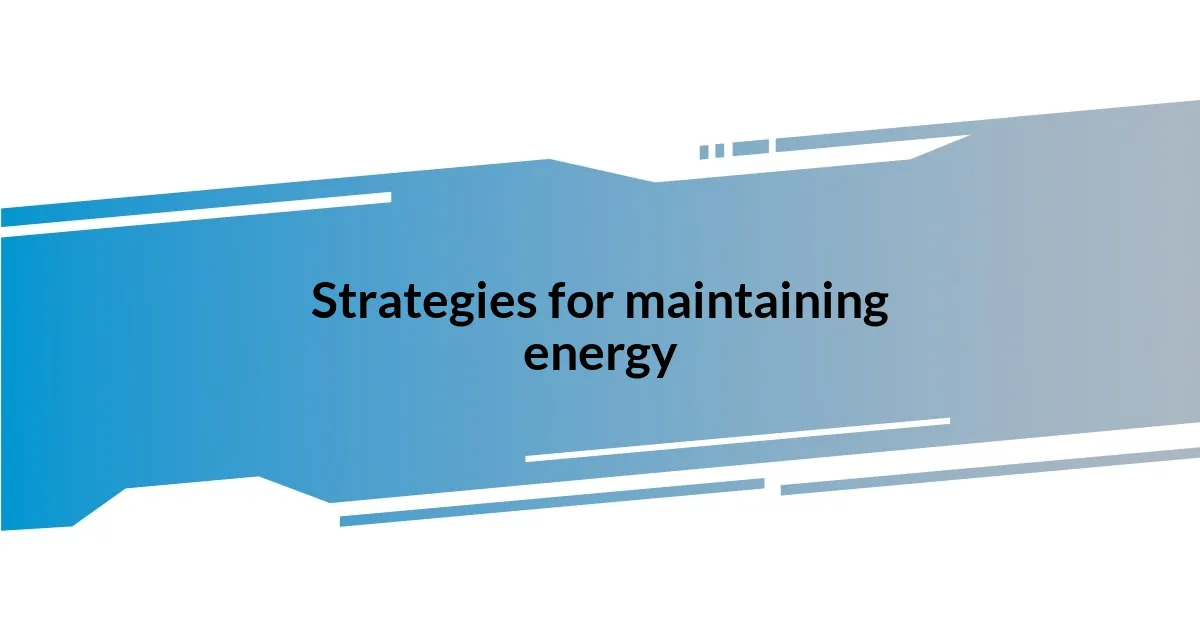
Strategies for maintaining energy
One of my go-to strategies for maintaining energy during rehearsals is incorporating physical activity. I vividly recall a session where we felt sluggish after a long day, and the director suddenly called for a group stretching break. Stretching not only reinvigorated our bodies but also sparked laughter as we attempted some silly poses together. It reminded me that sometimes, breaking up the routine with a little movement can work wonders for our focus and camaraderie.
Another technique I find effective is using music to boost energy levels. During a particularly grueling rehearsal, I played an upbeat playlist during our breaks, and it transformed the atmosphere. I noticed that even the most reserved cast members started tapping their feet and singing along. Have you ever witnessed how a catchy tune can shift the mood in a room? It becomes a reminder of why we’re there: to create and enjoy ourselves together.
I’ve also learned the power of setting short, energetic challenges. In one rehearsal, we did a timed scene run where we had only five minutes to get through a tricky section. The adrenaline of racing against the clock infused excitement into our work. The competitive spirit that emerged not only kept us engaged but also pushed us to think on our feet. How exhilarating is it to experience that rush of energy in the middle of what could easily turn into a mundane practice? It’s moments like these that remind me how crucial it is to keep things dynamic and lively.
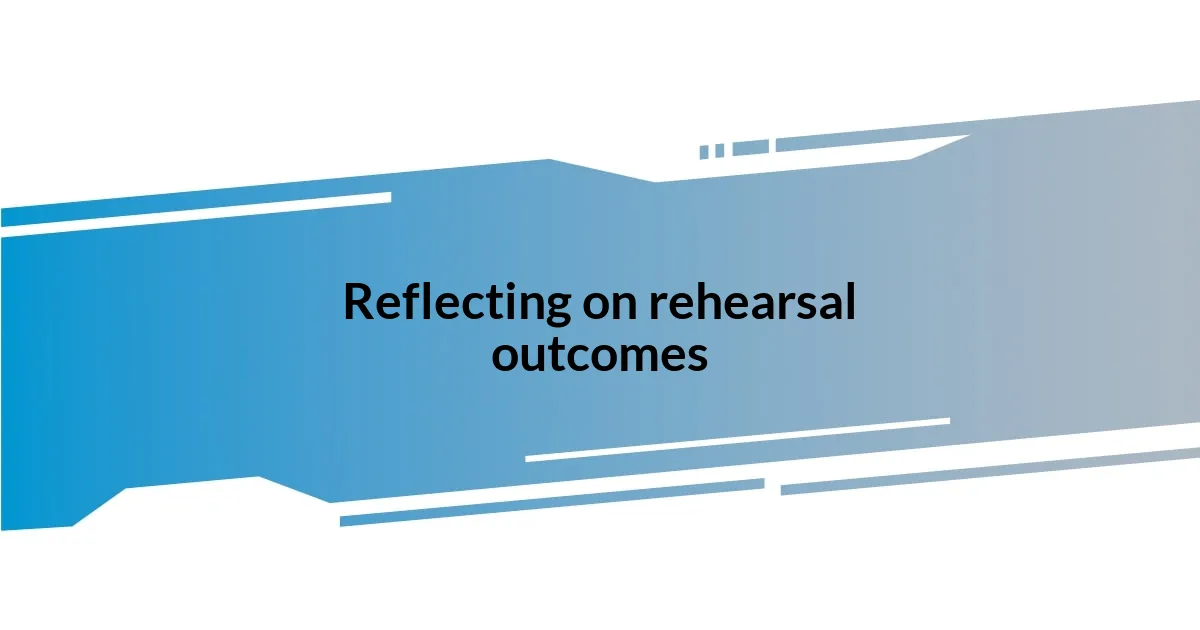
Reflecting on rehearsal outcomes
Reflecting on rehearsal outcomes is essential for my growth as a performer. After a particularly challenging rehearsal last week, I took a moment to sit quietly and process what had transpired. I realized that the areas I struggled with were often those I hadn’t fully committed to emotionally. How often do we miss the chance to connect deeply because we’re focused solely on the mechanics? This reflection inspired me to approach the next rehearsal with a renewed focus on emotional investment.
There’s something rewarding about tracking progress through reflection. Last season, after each performance, I created a simple rating system for my own performances based on clarity, emotion, and engagement. It felt a bit vulnerable at first, but over time, I noticed a pattern: my emotional engagement typically spiked during ensemble scenes where we were connecting as a team. Has this ever happened to you? Recognizing these trends not only boosted my confidence but also guided my preparation for future performances.
Open discussions about our rehearsal outcomes can also be transformational. I recall one time, after a particularly intense run-through, we gathered in a circle to share our thoughts. While it was nerve-wracking, hearing my fellow cast members express similar struggles made me realize I wasn’t alone in my journey. This shared vulnerability fostered a stronger bond among us. Have you ever felt that powerful mix of empathy and understanding when sharing experiences? It’s moments like these that not only improve our performances but cement our bonds as a collective.